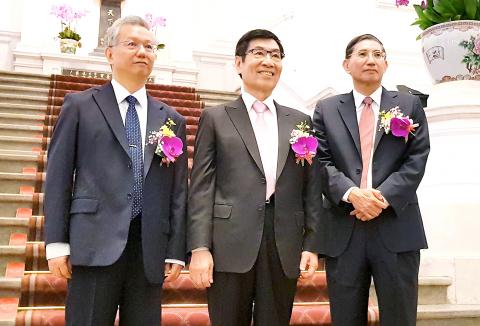President Tsai Ing-wen (蔡英文) yesterday awarded the Presidential Science Prize to three Academia Sinica academicians, who warned about a lack of research talent and expressed hope that medical research will improve in Taiwan.
One of the winners, Lee Yuan-pern (李遠鵬), is renowned for his research using free radical spectroscopy, a tool for studying the effect of global warming and air pollution, said Academia Sinica President James Liao (廖俊智), chairman of the prize’s steering committee.
The falling number of students pursuing doctoral degrees should be regarded as a serious social problem, as a shortage of researchers would affect the nation’s global competitiveness, Lee said.

Photo: Chien Hui-ju, Taipei Times
The government should encourage young people to be involved in basic science research and urge academics to work together on advanced research projects, instead of working alone, he said.
Lee is a younger brother of chemistry Nobel laureate Lee Yuan-tseh (李遠哲), who also attended yesterday’s ceremony.
Prize winner Chen Yuan-tsong (陳垣崇) — a former director of Academia Sinica’s Institute of Biomedical Sciences — is known for developing treatments for glycogen storage disease and Pompe disease, Liao said.
Chen has made significant contributions to Taiwan’s biomedicine industry, and the story of how he developed a drug for Pompe disease was adapted in the 2010 film Extraordinary Measures, Tsai said.
Chen was wronged, Tsai said, referring to accusations of trying to profiteer from a biotech company established by his family.
The Shilin District Prosecutors’ Office in 2011 declared Chen could not be charged.
Asked about his expectations regarding biomedical development in Taiwan, Chen said he is lucky to have succeeded in developing new drugs when the success rate is estimated to be one in 5,000.
While Taiwan has established quality medical services, it should move on to develop preventive and precision medicine, he added.
The other winner, Wei Fu-chan (魏福全), was the nation’s first research surgeon named an Academia Sinica academician in 2012.
Surgeons are finally recognized for their basic and clinical research abilities, instead of merely their surgery techniques, Wei said.
A world leader in microsurgery, Wei has performed many difficult surgeries on cancer patients or physically impaired people, Liao said.
Apart from promoting universal healthcare, Taiwan should make a concerted effort to bolster potentially promising areas to claim a leading role in global medicine, Wei said, adding that surgery and precision medicine could be highlighted.
Established in 2001, the nation’s most prestigious scientific research award is presented once every two years at the Presidential Office in Taipei.
Winners receive NT$2 million (US$65,527) each.

Alain Robert, known as the "French Spider-Man," praised Alex Honnold as exceptionally well-prepared after the US climber completed a free solo ascent of Taipei 101 yesterday. Robert said Honnold's ascent of the 508m-tall skyscraper in just more than one-and-a-half hours without using safety ropes or equipment was a remarkable achievement. "This is my life," he said in an interview conducted in French, adding that he liked the feeling of being "on the edge of danger." The 63-year-old Frenchman climbed Taipei 101 using ropes in December 2004, taking about four hours to reach the top. On a one-to-10 scale of difficulty, Robert said Taipei 101

A preclearance service to facilitate entry for people traveling to select airports in Japan would be available from Thursday next week to Feb. 25 at Taiwan Taoyuan International Airport, Taoyuan International Airport Corp (TIAC) said on Tuesday. The service was first made available to Taiwanese travelers throughout the winter vacation of 2024 and during the Lunar New Year holiday. In addition to flights to the Japanese cities of Hakodate, Asahikawa, Akita, Sendai, Niigata, Okayama, Takamatsu, Kumamoto and Kagoshima, the service would be available to travelers to Kobe and Oita. The service can be accessed by passengers of 15 flight routes operated by

Taiwanese and US defense groups are collaborating to introduce deployable, semi-autonomous manufacturing systems for drones and components in a boost to the nation’s supply chain resilience. Taiwan’s G-Tech Optroelectronics Corp subsidiary GTOC and the US’ Aerkomm Inc on Friday announced an agreement with fellow US-based Firestorm Lab to adopt the latter’s xCell, a technology featuring 3D printers fitted in 6.1m container units. The systems enable aerial platforms and parts to be produced in high volumes from dispersed nodes capable of rapid redeployment, to minimize the risk of enemy strikes and to meet field requirements, they said. Firestorm chief technology officer Ian Muceus said

MORE FALL: An investigation into one of Xi’s key cronies, part of a broader ‘anti-corruption’ drive, indicates that he might have a deep distrust in the military, an expert said China’s latest military purge underscores systemic risks in its shift from collective leadership to sole rule under Chinese President Xi Jinping (習近平), and could disrupt its chain of command and military capabilities, a national security official said yesterday. If decisionmaking within the Chinese Communist Party has become “irrational” under one-man rule, the Taiwan Strait and the regional situation must be approached with extreme caution, given unforeseen risks, they added. The anonymous official made the remarks as China’s Central Military Commission Vice Chairman Zhang Youxia (張又俠) and Joint Staff Department Chief of Staff Liu Zhenli (劉振立) were reportedly being investigated for suspected “serious